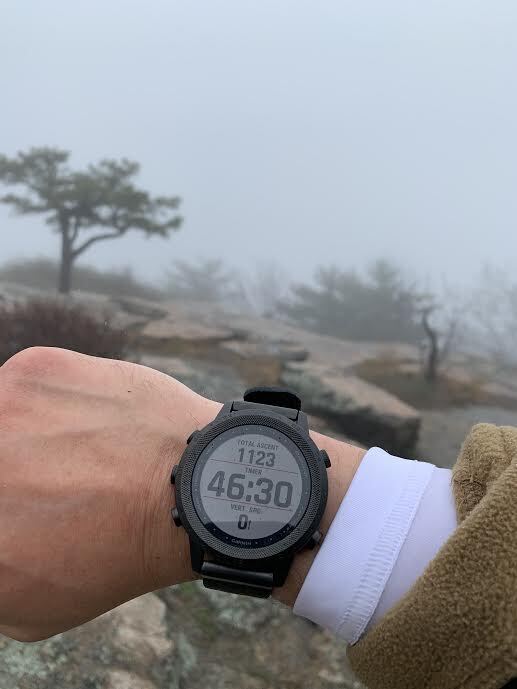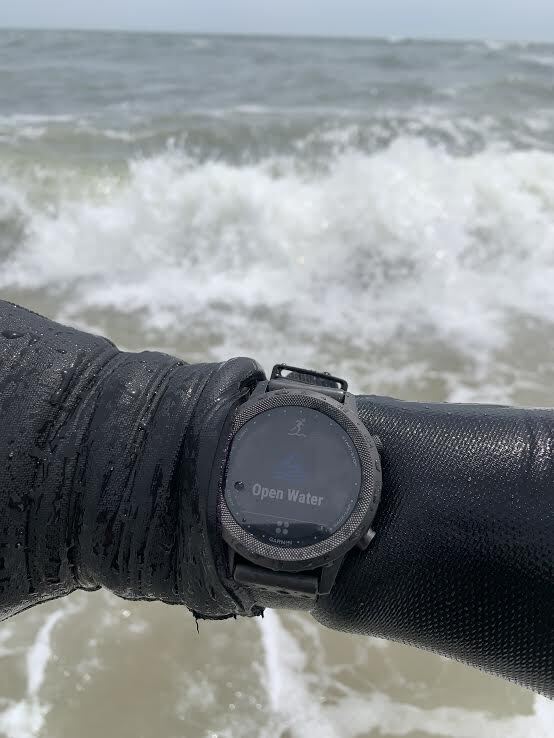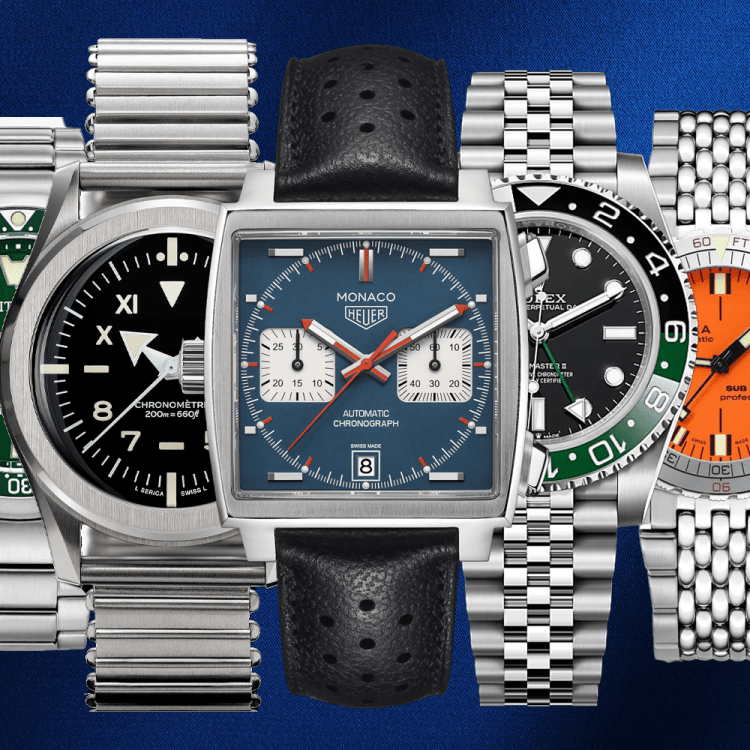Nota bene: All products in this article are independently selected and vetted by InsideHook editors. If you buy something, we may earn an affiliate commission.
When you’re lost in a scorching desert or being pursued by men in ’80s track suits with machine guns somewhere in Eastern Europe, a luxury timepiece with a James Bond movie endorsement is not going to be much use. The timing bezel might come in handy, and most hikers know how to use an analog watch to get a compass bearing. But unless there’s a pawn shop in sight, it’s just extra weight. They’re lovely pieces, don’t get me wrong: beautifully crafted and engineered for precision and longevity. I actually have a vintage (manual wind) Omega Seamaster in my collection, and it’s always a joy to wear when I’m in the office or running errands.
Today, most people would consider my 1964 Seamaster to be a dress watch, but in its time, it was a tool watch — just like the early Rolex Explorers. In fact, the original James Bond watch (from the books) may have been the Explorer, as Sir Ian Fleming wore one himself. However, in the first film, Dr. No (1962), Bond wears what is arguably the most famous adventure watch in the world, the Rolex Submariner (Ref# 6538). Would such a pairing have been likely? Yes. These subs were issued to Royal Navy divers, and there are countless articles on the web if you fancy a deep dive. But in 2020, the likelihood of a real-life Bond, male or female, wearing the priceless automatic watches that feature in the films is highly unlikely. It would be like undertaking a high-speed pursuit in a vintage car — completely ridiculous unless you’re Wes Anderson.
So, what timepiece could, arguably, be the rightful heir to the James Bond throne? After hours of research, I believe it could be one of Garmin’s Fenix watches, maybe the 6 Pro or the 51mm Tactix Delta. Or how about something from Finnish company Suunto, or even the Casio GPR B-1000 Series Rangeman?
These are all certainly good candidates. But Garmin’s MARQ Commander is a watch that not only has a HAHO/HALO/Static “Jumpmaster” feature, but would also look the part in a casino on the French Riviera. Priced at $1,950, the Commander is one of 10 MARQ timepieces that Garmin hopes will cross into the luxury market. The five other watches in this luxury range include the Captain, Aviator, Athlete, Driver and Adventurer.
Users’ reviews on YouTube of various Garmin watches often include phrases like “deployment to the Middle-East” or “our tasking was to basically draw fire,” which means that terms like “duty” and “accept the mission” used in Garmin’s advertising copy are more than just buzz. Realistically, most people with an MOS number would probably go for something in the Garmin Fenix range — simply because of the price point. But for those rare individuals like the fictional Agent 007 who want something that blends in as much at a charity gala as it does on a mountain peak, the MARQ Commander delivers. I know this because I just spent the past week with one in the mountains, the sea and the urban jungle.

While each MARQ watch is geared toward a specific pursuit — for example, the MARQ Driver is preloaded with over 250 racetracks around the world; the MARQ Aviator has an HSI course needle and flight logging capabilities — the Commander is a bit of an all-arounder. Let’s start with the things I’m never going to use. First is the night-vision mode, which makes the display compatible with NVG. Second is the watch’s capability to calculate high-altitude release points in Jumpmaster mode. And tied for third are “tactical mode” (my wife likes to know where I am) and the “kill switch.” This latter feature, in case you were wondering, allows the wearer to clear all user memory within 10 seconds or less. Oh, and hopefully I’ll never have to use the “Dual-format GPS coordinates” feature, which includes MGRS coordinates, the same stuff used by NATO militaries for global positioning.
Now for the features which — as an enthusiastic but mediocre sportsman—I found absolutely essential. Firstly, the heart-rate sensor. I’m in my mid-forties and have a family, so keeping an eye on my heart rate is vital, especially when, out of the 2,000 songs you can store on the device, Metallica’s “Ride the Lightening” starts blasting. I also came to rely on the barometer, thermometer, altimeter, hydration tracking, respiration tracking (how “well” you’re breathing during the day, during sleep and during activity) and the pulse oxygen sensor. In “run” mode (as opposed to “ski” or “row” or “golf” or almost any other activity you can think of), I utilized pacing data to keep track of my progress over a 15-mile run around Manhattan. The round-trip routing feature allowed me to set a distance for my run then choose one of several courses that would all bring me back to my starting point.
Although I didn’t get to ski in the watch, the 2000 topographical ski maps in the 32 GB memory are another benefit to this smartwatch. The GPS is also more than adequate: when I strayed from my path on a three-hour mountain hike, I quickly corrected course, buttoning my way to the compass setting to find the trail. At first, I the GPS felt tricky, but once I learned how to zoom in and pan (by pressing two of the five buttons in a particular order), I was able to track my intended path over the mountain with ease, despite low-light and some mist. If I had been in the Nevada desert, and really lost, there’s also a “Backtrac” feature that guides you back to your point of origin.
I couldn’t fully use the “open swim” setting, as the Atlantic was too rough on the day I headed to the coast. (If I’d learned how to use the weather functions in the watch properly, I would have known that.) I did go for a paddle however, and thoroughly enjoyed wearing a $2,000 timepiece in the pounding surf. It fit snugly over my 5mm wetsuit — though I forgot to bring the rubber strap which comes in the box and is probably intended for swimming and kayaking.

Now for the most critical test of any smart watch: battery life. According to the Garmin website, the Commander can go for up to 12 days without a charge. This decreases to 28 hours in GPS mode, and nine hours when GPS is combined with music. For ultra-runners, these numbers are worth noting — though the watch is designed for charging on the wrist if you have a mobile battery pack.
One of the features that makes this watch so versatile is the size. At 46mm, it doesn’t look like a landmine strapped to your wrist. Sure, it’s hefty in terms of thickness (sitting 14.4mm off the wrist), but the matte-black DLC coated titanium bezel and case play down the size, while the domed sapphire crystal and Jacquard-weave strap make it look, well, expensive, unlike many smartwatches I’ve seen that could have been made on a 3D printer at an after-school club.
Like most things, the MARQ Commander has a few downsides. The screen colors seemed a bit washed out from time-to-time — though this might have something to do with the Herculean battery life, according to watch blogs. However, in bright sun and underwater, the display was clear and the colors sharp. Secondly — and this is not necessarily a bad thing if you intend on really using the watch — the learning curve is steep. I spent four consecutive hours learning how to use the Commander, and it still wasn’t enough time, as the range of features is dizzying. (After my 15-mile run, the watch informed me that it would take four days for me to fully recover. I still don’t understand how it knows that.) And in light of the price tag, it’s worth noting that this is probably not a watch you’ll pass down to your grandchildren.
All in, the Commander is an authentic tool watch that uses all the latest technology to assist the wearer when running, climbing, skiing, jumping out of aircraft, playing golf, swimming, predicting the weather, pinpointing a location, tracking heart rate or evading the attack dogs of a sociopathic oligarch by finding the closest Starbucks — er, I mean, body of water. While the Commander may not go up in value over the years as changing technology renders it obsolete, it’s perhaps the only watch I know of that has been engineered for both luxury and keeping the wearer alive in the most challenging physical and social environments. If you want something solely to wear when you’re freezing, sweating or underwater to 10ATM, there are cheaper options. But if you want something you can keep on as you head to the office, the MARQ Commander takes care of business.
We've put in the work researching, reviewing and rounding up all the shirts, jackets, shoes and accessories you'll need this season, whether it's for yourself or for gifting purposes. Sign up here for weekly style inspo direct to your inbox.
























